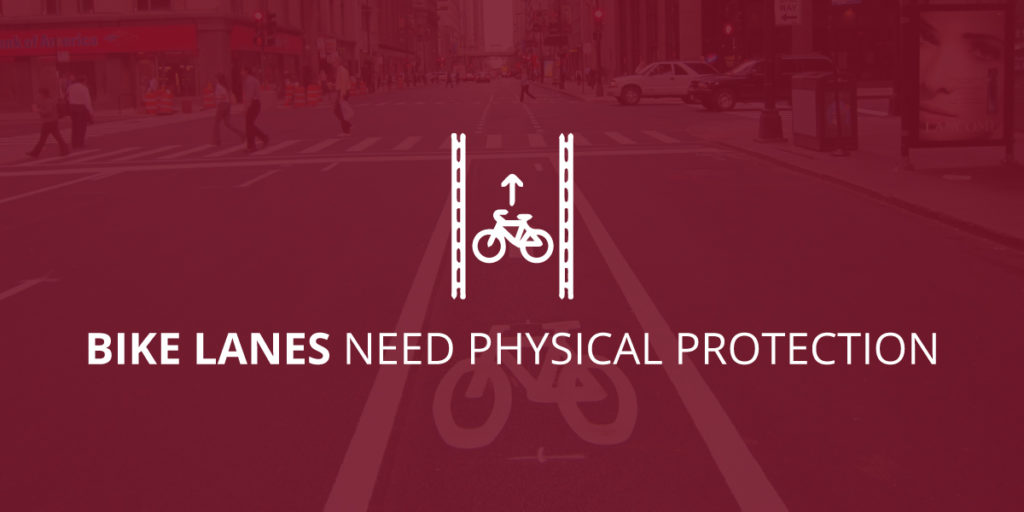Table of Contents
Toggle
Bicycling is a common choice of transportation for many Colorado residents, especially those in Denver. However, bicyclist fatalities are on the rise in Colorado. In 2018, bicyclist deaths reached a 16-year high, at 22 fatalities. The rate of bicyclist deaths has been steadily increasing since 2002, leaving many concerned and determined to make Colorado roads safer for these individuals.
Current Safety Measures for Bicyclists in Colorado
Currently, most Colorado roads use painted bike lanes to separate bicyclists from motorists.
However, an observational study out of Australia showed that painted bicycle lanes may be counterproductive. According to the study, a large percentage of motorists traveled within 39 inches of bicyclists traveling on painted bike lanes.
In areas with higher speed limits, motorists were more likely to get even closer to bicyclists.
Interestingly, motorists left more space for bicyclists when there was no painted bicycle lane.
Colorado Laws Do Not Always Protect Bicyclists
Many Colorado bicyclists find traffic laws confusing. Even while using a bicycle lane and traveling through a green light, bicyclists may not have the right-of-way in a crash.
Although there is a statute that requires motorists to leave three feet between the car and a bicyclist, and another law that prohibits drivers from being careless or imprudent around bicyclists, bicycle accidents still occur frequently.
Many motorists continue to travel too closely to bicyclists. Additionally, many bicyclists are surprised that they are being blamed for accidents that were actually caused by motorists.
The Benefits of Protected Bike Lanes
Areas that have implemented protected bike lanes have seen positive changes in their communities.
A protected bike lane is a separate area for bicyclists, similar to a sidewalk. The area may be separated by planters or other types of barriers to offering an additional layer of protection from motorists.
In New York City, a protected bike lane on 9th Avenue led to a 57 percent decline in bicyclist injuries.
In general, protected bike lanes are linked to a 90 percent reduction in bicyclist injuries per mile as compared to roads without such lanes.
In intersection accidents, protected bike lanes reduce injuries by 75 percent.
Protected bike lanes are 7 times more effective than a painted lane. These protected lanes offer much more protection to bicyclists.
Bike lanes have seen positive feedback from residents as well. Those living in areas with protected bike lanes want to see more of these lanes created.
Additionally, those living in areas with protected bike lanes are much more likely to use their bicycles for commuting instead of their vehicles.
If You Are Injured While Riding a Bike, It May Be Possible to File a Negligence Action
Bicycle accidents are especially dangerous because an individual on a bicycle is no match for a car or truck. These accidents often cause permanent, debilitating injuries.
Motorists often try to blame bicyclists for accidents, even when they are not at fault. If you have been injured in a bicycle accident, you need to speak with an experienced Denver personal injury attorney to learn about your legal options. If you were injured due to someone else’s negligence, you may be entitled to damages.
If you prevail in a personal injury claim against a negligent motorist, you may receive the following types of damages:
- Medical expenses
- The cost of future medical care
- Lost wages
- The cost of remodeling your home to accommodate an injury
- Pain and suffering
Other types of damages may also be available, depending on the facts of your case. You should not have to face thousands of dollars in expenses when you were not at fault for your accident.
Contact Donaldson Law, LLC Today to Discuss Your Case
Attorney Jennifer Donaldson understands the stress and anxiety that a bicycle accident causes victims and their families. Our Donaldson Law, LLC Law firm has helped many bicycle accident victims recover compensation to cover their medical bills and other expenses. To schedule a free consultation with our firm, contact us at 303-458-5000.
















